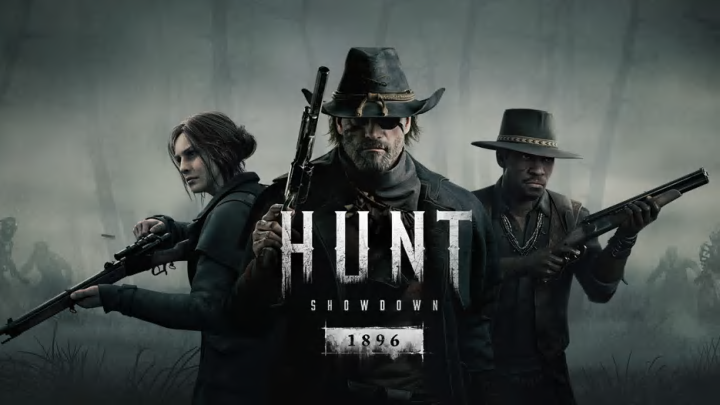Hunt: Showdown 1896 interview: new traps, future mobs, and more

Its boots muddy and heavy from the bog of the bayou, Hunt: Showdown isn’t slowing down. With its latest update, Hunt: Showdown 1896, Crytek’s extraction shooter steps into the future – in the context of the game’s timeline, its fresh biome, mechanics, and even the tech powering it.
“Internally, we believe that Hunt’s best days are ahead of it,” game director Scott Lussier tells me with a wide, excited grin.
The new update whisks players away from the mirk and mire of Louisiana to Mammon’s Gulch in sunny Colorado, a desolate strip of land where industrial machines suck up oil from the earth and winding mines scar the hills. What was once a verdant paradise is now rotten, fetid, and full of terrors, among them a new wild target called the Hellborn.
When the update lands tomorrow, players will step into this fresh battleground to track down mythical beasts and grab their bounties. Your goal? To extract safely before you’re killed by hellish creatures or set upon by other players with their eyes on the same prize. It’s one of the best battle royale games around, mixing the best bits of PUBG with the best of Tarkov but with a personality and style all its own.
“The first five years of Hunt was the bayou era,” Lussier explains. “Right now we've left the bayou, gone into Colorado, and now our next map, who knows what it'll be, but it won't be in the bayou. [It’s about] taking this universe to new places and introducing weapons and mechanics as we look into the future.”
That means in practice that Mammon’s Gulch will take over the game for the first month, removing all other maps from rotation, though Lussier says they’ll be reintroduced over time.
The first map to come back after 30 days will be Stillwater Bayou, while the remaining maps will appear in another update down the road, after receiving some love from the level design team. Crytek has plans for the next 18 months of Hunt at a minimum, though Lussier says the team always leaves room to react to player feedback.
Mammon’s Gulch is huge and varied, boasting much more verticality than the old maps, and there are new ways to mess up and give your position away. As well as dying horses, players will now have to be careful around downed cows if they don’t want to give away their positions, and if they step into a cave, they might have to deal with a swarm of bats escaping the cavemouth. “In future updates,” Lussier says, “we're thinking about adding them into certain buildings just to add to the theme.”
Crytek is using everything it’s learned since Hunt’s early access launch in 2018 to create Mammon’s Gulch. A major consideration is how the level designers build compounds to prevent deadlocks, making sure there are more ways to infiltrate and get the drop on a hunkered-down team.
“We're trying to break up these stalemates,” Lussier explains. “And so what we've done in Colorado is make sure that, on average, there's about six entrances or exits into the boss chambers. [Another] big change is with the pine trees, we're seeing more escapes from [losing fights]. You can hide at the bottom of trees, or you can hide in different areas, or take a point of elevation to turn the tide.”
As a defender, traps will be more important than ever, making sure you’re covering entrances that don’t have a gun trained on them. To help facilitate this, Crytek now allows you to equip a bear trap in the equipment menu, so you’re not at the whims of the on-map loot. Additionally, they can be placed freeform, at angles, covering windows and walls, to catch your attackers by surprise.
Conclusive fights are the design goal on Crytek’s side. As well as making sure the level design leads to fewer stalemates, conclusively killing off an enemy team won’t require you to sit on top of a dead body for ten minutes anymore.
When burning out downed hunters to prevent a revive, the timer is now much shorter. Not only will the winning team have to watch a downed enemy for a shorter time, but the downed person’s teammates will have to be much more proactive if they want to bring back their pal. Crytek is currently thinking about new ways for players to extinguish flames outside of the traditional chokebomb method.
“The second one when it comes to fire and revives is Necromancer,” Lussier explains. “Necromancer is a burn trait now. So if [we’re] playing together, and I have Necromancer, if you go down, I can revive you from a distance once. The hardest part of that change is just getting into the habit of reequipping it when you’ve used it.”
Solo players will also only get one chance to revive, which is great news for anyone who doesn’t want to spend their entire match watching a corpse reanimating on a loop – we’ve got the US elections for that. “We've seen the memes on Reddit where it's like, this is how you deal with the solo, and it's 78 traps, all the fuses,” he laughs. “We were like, ‘Okay, it's time to make a change’.”
Another change that should make fights more dynamic is the introduction of ballistics. Previously, bullets traveled in a straight line in Hunt, no matter how far away from your target you were. In 1896, every single projectile is simulated and travels through the world as it would from a real gun. The spread of a shotgun, the drop of a long round from a distance – it’s all correct.
“From the design side, what we liked about ballistics is that we get to open up and re-evaluate our entire arsenal and say, ‘Okay, we've had a long ammo meta’,” Lussier explains. “And so as soon as people hear ballistics, they go, ‘Oh, so you're just leaning into long ammo.’ Now, long ammo has its place, but the biggest change we were able to make as soon as we introduced ballistics is to add an infinite headshot range for any weapon you use at a distance. If you hit a headshot, they are now viable.”
In early playtests, the telemetry shows players moving away from long ammo and gravitating toward medium and even compact, thanks to those new headshot kill guarantees. Luckily, this won’t extend to shotguns (though they have had their range increased) so you won’t take a single pellet to the head from someone firing indiscriminately into buildings. Phew.
Of course, it won’t just be other players you contend with. Part of what makes Hunt special is its ecosystem of zombies, rabid dogs, and other creatures roaming the map, and how these can interact with player fights, draw players together, or catch you off guard. There won’t be any new fodder enemies added in the 1896 update – Crytek is actively testing these, with Lussier telling me, “Trying to expand our normal AI cast is high on the list throughout this year, and it might bleed into 2025, but we are looking for more dynamic enemies that players can fight.” But there is that new wild target: the Hellborn.
As with Rotjaw on the old maps, you’ll have to track this wild target down differently. Instead of following scent trails, this time you’ll have to follow ethereal screams you can hear while in Dark Sight vision mode. When you do track it down, it’ll be unlike anything you’ve fought in Hunt.
“We've always wanted to do a primarily ranged target, whether it's a boss target or a wild target, and it worked out really well for the Hellborn,” Lussier says. “With this wild target, you are fighting at range the entire time. If you try to get close, he's got an AOE combustion. And so if you run up on him and try to melee him, you get burned. We've also added some new mechanics around how the Hellborn will close the distance if you're trying to engage him from afar and you're behind a rock.”
All of this will be much crisper and smoother thanks to a significant game engine upgrade. Crytek has always been on the cutting edge with its proprietary game maker, CryEngine, so it’s surprising it’s taken this long to get native versions of Hunt on Xbox Series X and PS5, where the game now hits and maintains a solid 60fps, but even PC players should be happy with this fidelity upgrade.
“You have better load times, you have higher visual fidelity,” Lussier says. “There's just less popping and less rendering issues across the board. So you get a more consistent experience with this engine upgrade and the visual fidelity inside of the level – before, where you would maybe only see just like a little pathway of mud, we're able to put more props in these areas, and we're able to add a little bit more soft cover for players. If you have a pretty good machine, and you're running on Ultra, that experience is absolutely beautiful.”
It sounds like it’s really shaken the mud off its boots. You’ll be able to see it for yourself when Hunt: Showdown 1896 launches for Xbox Series X, PS5, and PC tomorrow, August 15.
